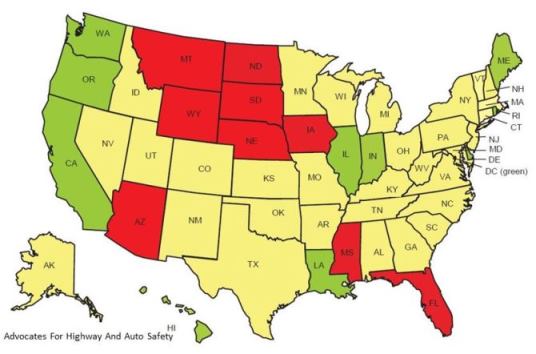
Florida Fails When It Comes To Safe Driving Laws
January 22, 2015
When it comes to safe driving laws, Florida ranks near the bottom compared with other states according to a report published today by Advocates for Highway and Auto Safety (Advocates). The report ranks states based on fifteen basic driving safety laws, giving points for each law a state has on its books.
The report used a three color grading system based on each state’s overall score. Grades given were:
- Green – State is significantly advanced toward adoption of all Advocates’ recommended highway safety laws.
- Yellow – State is advancing but has numerous gaps in its highway safety laws.
- Red – State falls dangerously behind in adoption of key safety laws.
Florida was one of nine states to receive a red score with only six out of the fifteen recommended safe driving laws enacted.
This year’s report stresses what the Advocates call “lethal loopholes” in laws that fail to protect drivers and passengers and contribute to preventable deaths and injuries. Lethal loopholes refer to laws that don’t go far enough to protect vehicle occupants or that are “secondary enforcement laws.” For those unfamiliar with secondary enforcement laws, we need to take a moment to explain how they work.
A good example of a secondary enforcement law in Florida is the new anti-texting law that took effect in October of 2013. The law, which prohibits drivers from writing, sending, or reading written communications on any wireless communications device, sounds like a good law at first glance however, the law is a secondary enforcement law. That means that a law enforcement officer can’t stop a driver and issue a ticket just for texting alone. The officer must first witness a driver texting while, at the same time, violating a primary enforcement law such as speeding or running a red light before stopping the driver and issuing a ticket. As a result, Florida’s anti-texting law is basically toothless and law enforcement agencies throughout the state report that they have issued very few tickets under this law.
When ranking states on whether or not they had one of the fifteen laws on the books, the Advocates didn’t count those laws that were secondary enforcement laws. They also didn’t give points to laws that didn’t go far enough to protect vehicle occupants from injury or death. In Florida’s case, those laws include:
- Florida’s newly enacted child booster seat law that only requires the use of booster seats for children under the age of five. Adult seat belts don’t fit children properly and the Insurance Institute for Highway Safety (IIHS) recommends that children remain in a booster seat until they are at least 4’9” tall. For the average child, that can be anywhere from 9 to 11 years of age. Effective booster seat laws require the use of a booster seat until the child is either 4’9” tall or 9 years of age.
- Florida’s seat belt law is a primary law for occupants of the front seat and anyone under the age of 18 no matter where they are seated. However, it doesn’t require the use of seat belts by back seat occupants over the age of 18.
- Graduated Driver License (GDL) laws are designed to give teen drivers more driving experience without distractions until they have more experience. Effective GDL laws restrict the number of passengers a teen can carry, limit night time driving, and the use of cell phones. Florida’s GDL laws have no restrictions on passengers or the use of cell phones by newly licensed teen drivers. In 2012, Florida came in at third place after Texas and California in the number of highway deaths involving teen drivers.
- Florida’s motorcycle helmet law allows riders over the age of 21 with at least $10,000 worth of medical insurance coverage to ride without a helmet. Florida, with only 47% of the riders using helmets, led the nation in motorcycle deaths in 2012.
For more information on how Florida’s safe driving laws scored, read: 12TH ANNUAL ROADMAP OF STATE HIGHWAY SAFETY LAWS
Image compliments of: Advocates for Highway and Auto Safety
